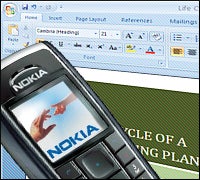 |
Microsoft and mobile phone giant Nokia said Wednesday that they have agreed to form a broad alliance that will begin by porting Office Mobile applications to run on Nokia’s Symbian operating system.
The deal, with will see Office first appearing on Nokia’s (NYSE: NOK) Eseries enterprise devices, marks the first time that Microsoft (NASDAQ: MSFT) has ported its Office applications to run on any smartphone operating system besides Windows Mobile.
The effort also aims to go far beyond simply developing a version of Office Mobile for Symbian. It also includes plans to provide access to Microsoft enterprise products such as SharePoint, Office Communicator Mobile, and System Center management tools.
Today’s deal also means the two companies will collaborate on design, development, and marketing of productivity solutions for Nokia devices to businesses, carriers, and individuals, according to a joint statement.
During a call with media and analysts, executives from both firms highlighted the large pool of potential mobile software customers that Nokia brings to the table. The Finnish company is the world’s largest mobile phone maker with some 200 million smartphones already in the market worldwide, it said.
“This is a long-term relationship … that will enable people to access SharePoint from Nokia devices and businesses will be able to manage them using System Center,” Kai Öistämö, Nokia’s executive vice president for devices, said during the call.
If all goes according to plan, Microsoft next year will ship a version of Office Communicator Mobile on the Symbian operating system, followed by other Office applications, including Word, Excel, PowerPoint, and One Note.
While it might seem counterintuitive that two fierce mobile operating system competitors like Microsoft and Nokia would enter into such a collaboration, the two are motivated by the prospect of cashing in on both companies’ market strengths.
“Nokia has over 45 percent of smartphones world wide,” Stephen Elop, president of Microsoft’s Business Division, said on the call.
However, the new alliance does not mean that Microsoft will abandon Windows Mobile — the two firms will continue to compete in other areas. Still, collaboration between the two has already begun, according to both executives.
Neither will Microsoft products only target Nokia’s Eseries enterprise smartphones. Plans are underway to expand onto other Nokia devices, Öistämö said.
Nokia has been a major backer of the Symbian smartphone operating system for years but in June 2008 decided to buy the OS outright and open sourcing the software, donating it to the Symbian Foundation.
Microsoft, meanwhile, has been working to popularize what has become known as Windows Mobile for years, with less-than-stellar results. The latest version, Windows Mobile 6.5 is due out in several mobile handset makers’ devices by the end of the year.
However, it’s Symbian that has long led in smartphone operating systems, while Windows Mobile continues to lag, according to recent stats from Gartner. In the enterprise, Research In Motion’s BlackBerry devices rule and have also made significant inroads into the consumer space, where the Apple iPhone has likewise emerged as a major competitor.
Today also isn’t the first time that Nokia and Microsoft have worked together. The two in recent years signed several smaller deals to cooperate in areas that include digital rights management (DRM) and the software giant’s Silverlight streaming media technology, as well as Microsoft’s Exchange ActiveSync e-mail syncing technology.


